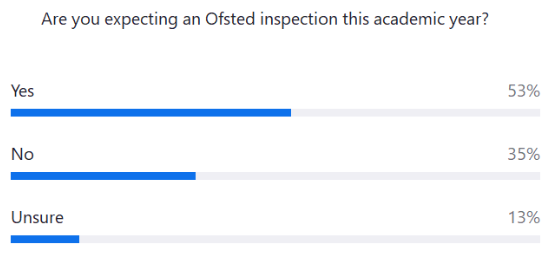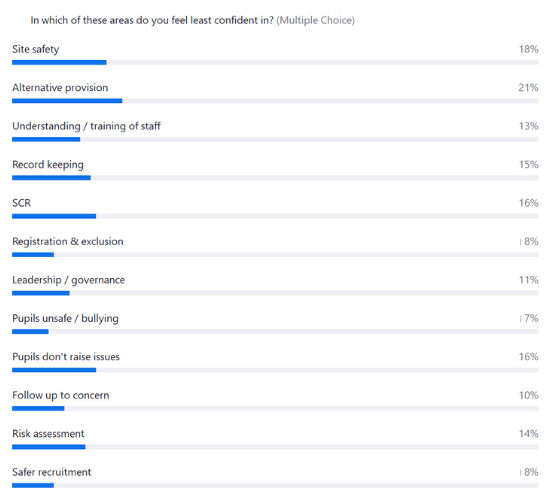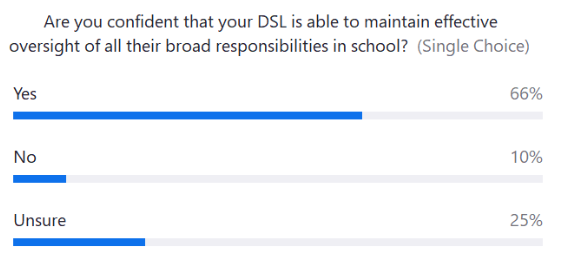Analysing Ofsted Inspections When safeguarding is ineffective
_1000.png)
This blog is based on Judicium’s Safeguarding ‘Sofa Session’ from the 11th of September, with our resident expert James Simoniti. This session focused on the key findings from Ofsted inspection reports where safeguarding has been judged to be “not effective", the reasons for “not effective” safeguarding which are frequently noted in inspection reports and practical steps to take away from previous findings.
Poll 1

Changes since 2022
Since our last Sofa Session on safeguarding and Ofsted in 2022, Ofsted has changed how it conducts inspections of safeguarding. Inspectors now receive mental health awareness training and ensure those being inspected have appropriate support in place. There are also procedures which allow a school with ineffective safeguarding but strengths elsewhere, to receive a graded inspection within three months.
Furthermore, how the Safeguarding section of Ofsted reports is written has changed. Whereas previously for schools with effective safeguarding, this would highlight the strengths of the school, this detail has been removed, and the reports now simply read ‘The arrangements for safeguarding are effective’. Ofsted explained this detail was removed to ‘reduce workloads’, as some were looking at these judgements and trying to implement aspects and programmes their school simply did not need. However, many schools are really upset by this change and feel that their hard work in safeguarding children is not being recognise. This is especially true for those schools facing more significant safeguarding challenges and thus put greater resources into this area, such as those in more deprived areas. This certainly fits the classic problem of safeguarding - we only hear about it when something goes wrong, and we don’t celebrate the everyday successes.
N.B. If you are concerned about an inspection and feel you would benefit from more in-depth CPD certified training, we have a course you can attend called ‘Understanding Ofsted Inspections of Safeguarding’. Our next session of this is being hosted online on Monday 30th September and it will cover how to prepare for the inspection and what to do when you get the call. You can learn more and book HERE.
For schools with ineffective safeguarding, the inspection report does go into detail about the reasons. Though rare, these Ofsted reports will be the focus here.
Where we are now
In 2022 Judicium’s Safeguarding team combed through every Ofsted report where safeguarding was judged to be ineffective and categorised the reasons for this into 12 main areas. For example, if a report criticises poor record keeping and states that inappropriate alternative provision was being used, it tallied in both the ‘Record keeping’ and ‘Alternative provision’ categories. The full list of categories are:
- Site safety
- Alternative provision
- Understanding / training of staff
- Record keeping
- SCR
- Registration & exclusion
- Leadership / governance
- Pupils unsafe / bullying
- Pupils don't raise issues
- Follow up to concern
- Risk assessment
- Safer recruitment
Poll 2

-
- Not recording in sufficient detail or having inappropriate recording systems. Older reports found many schools were using paper record keeping systems ineffectively, though these are increasingly rare with the growth of accessible digital systems.
-
- Governors being unaware of how to strategically challenge leaders around safeguarding and simply taking their word for things.
-
- Not referring serious concerns or not referring concerns promptly.
Since 2022, the number of schools with ineffective safeguarding has more than doubled from 59 to 135 schools so there is a more detailed dataset to understand inspections. The data is totally anonymised and we want to learn from the patterns we find, rather than the individual instances.
In 2024, we found the three primary reasons for ineffective safeguarding actually remained consistent.
- Record keeping remains the most common reason referenced in Ofsted reports (53% of schools with ineffective safeguarding have this)
- Leadership and Governance (45%)
- Inappropriately following up concerns (44%).
Other areas of prominence include:
- ‘Understanding/training of staff’ (42%), where staff have not received training in line with statutory guidance or have inadequate safeguarding knowledge
- pupils being unsafe or bullied (42%), relating to children being at risk from the behaviour of other children or inappropriate physical intervention from staff.
- Registration/exclusion - 18%
- Safer recruitment - 18%
There have been some areas that have become more prominent in Ofsted reports. Interestingly, a school is more likely now to be found to have ineffective safeguarding due to an unsafe site – just 5 schools were pulled up on this by Ofsted in our 2022 data, but that has now risen to 16, a percentage increase of 220%. Site safety often related to medication being stored incorrectly or children climbing onto the building itself.
Another area that is now more prominent in Ofsted reports is the SCR (Single Central Record). This rose from 4 schools to 11, an increase of 175%, often down to required checks not being recorded on the SCR or significant errors.
N.B. At Judicium we have an online SCR training ‘Understanding the Single Central Record (SCR)’ next taking place in December that you can find details for on the website.
.png)
Remit versus responsibility
Both site safety and the SCR feed into the classic problem of a DSL - remit versus responsibility. It’s very unlikely a DSL will directly manage the physical environment, or personally oversee the SCR – these are rarely in their remit.
Yet technically, these are the responsibility of the DSL - building and maintaining a culture of safeguarding, ensuring staff are suitable to be working with children and that where they learn is physically safe. They would certainly be included in the ‘Safeguarding’ section of an Ofsted report and be put down as findings in ‘Leadership and governance’.
Poll 3

So how does a DSL maintain effective oversight of these areas of responsibility
It’s incredibly hard for a single person or even a team to oversee all areas of safeguarding responsibility, as these are so extensive. Safeguarding encompasses all areas of school life and is everyone’s responsibility.
Judicium finds some of these peripheral areas are the ones DSLs are least confident in.
For example, the DSL is rarely confident in leading through the SCR during an audit, but we have found the SCR was a risk area for 1 in 4 of our safeguarding audits.
In the academic year 2022-23 we set an average of 5 actions in relation to the SCR and safer recruitment practices per school visit.
In addition, this academic year we have seen the highest use of our advice line particularly for questions relating to site safety, hirings and lettings, HR e.g., risk assessing staff, single central record and safer recruitment. Our school and trusts clients are increasingly asking us about these broader remit areas.
Does the DSL need to be on the SLT?
The guidance is quite clear in this area. Paragraph 102 of Keeping Children Safe in Education 2024 states “Governing bodies and proprietors should ensure an appropriate senior member of staff, from the school or college leadership team, is appointed to the role of designated safeguarding lead.” At Judicium we have also seen an Ofsted report that criticised a school for having a DSL who was part-time and not on the SLT (and was ultimately found to be inadequate).
What does this mean for schools?
The reasons for ineffective safeguarding remain largely consistent with the previous findings. However, first and foremost we must remember we don’t simply safeguard for Ofsted.
We safeguard because it’s our responsibility when we work with children, and we want to keep them safe regardless of any inspectorate. Ofsted simply check we are safeguarding appropriately and in line with statutory guidance.
However, our findings do highlight common areas of weakness that we should be mindful to address.
Top Tips
- Retain your focus on continuously improving record keeping.
We review school safeguarding records on a regular basis and advise you do this too for your own records. Sit down with someone else, ideally an expert and an appropriate professional given the nature of the records, and ask them to read through the record. Can they understand what is happening from the record alone? If you find yourself having to explain what happened verbally, then the record probably isn’t detailed enough. NB: consider making the record anonymous so the matter remains confidential and most digital systems have a functionality allowing this.
- Invest in your governance.
Make sure that your governors/trustees have received appropriate safeguarding training and are able to ask difficult questions. You’d rather they be asking these questions than Ofsted! In particular, the safeguarding governor or trustee should feel confident in executing their strategic challenge function. For further training on this see our Safeguarding for Governors training courses. We often find governors see this is an area they find challenging, trying to balance their desire to support with the role to challenge. Judicium offers clients templates to support governors and trustees to ask the right questions, interrogate data and ensure they are triangulating what leaders are telling them, which is another area Ofsted has criticised.
- Follow up concerns appropriately and promptly.
This goes for all staff and not just the DSL. Staff should know to share this information with the safeguarding team immediately and record it in detail. The safeguarding team should also ensure they have good contacts around the local authority and are aware of the support on offer locally.
- Provide high quality training for staff.
Staff should know about key issues facing children in your setting and what to do when they encounter them. They should have a good understanding of the systems used to report concerns at your school. Subscribers to our Judicium Safeguarding Support service get weekly briefings to share with staff and templates for inset day training too.
- Listen to your pupils.
Pupil voice should be routinely gathered in your setting, but does it as questions about safety? Do children in your setting feel safe? Are there any areas where they feel at risk? How do they feel bullying is addressed at your school? Pupil and staff surveys and focus groups are powerful tools in allowing you to understand the safeguarding culture of your school. Even if you are compliant in every area, if your staff and pupils don’t feel the same, then do have a strong safeguarding culture?
Additional Information
Judicium Education’s Safeguarding Service is intended to assist schools in meeting the statutory requirements and guidance for schools and colleges on safeguarding children and safer recruitment. For more information, please visit here.
We also offer bespoke Safeguarding Training options and eLearning packages.
If you require any support in any of these steps or would like to talk to someone surrounding some support for your school, please do not hesitate to call us on 0345 548 7000 or email georgina.decosta@judicium.com
You can follow us on Twitter (X) : @JudiciumSG @JudiciumEDU
If you’d like to review Judicium’s forthcoming sofa sessions please click here
© This content is the exclusive property of Judicium Education. The works are intended to provide an overview of the sofa session you attend and/or to be a learning aid to assist you and your school. However, any redistribution or reproduction of part or all of the contents in any form is prohibited. You may not, except with our express written permission, distribute or exploit the content. Failure to follow this guidance may result in Judicium either preventing you with access to our sessions and/or follow up content.
Related content
.png)
This is a summary from Judicium’s Safeguarding and Thrive ‘Sofa Session’ from 3rd December, with our Judicium Safeguarding consultant Joanne Bocko, Thrive Head of Innovation and Principal Trainer, Viv Trask-Hall and Director of Thrive, Tom Preston. Drawing on decades of combined experience in safeguarding, governance, SEND, leadership, and mental health, the panel unpacked how the framework’s shifts will impact schools, what Ofsted will be looking for, and how leaders can position themselves for success.

This is a summary taken from Judicium’s SEND and Safeguarding ‘Sofa Session’ from 5th November, with our Safeguarding and SEND consultants Rik Chilvers and Simon Hanley. In this session we discuss the new SEND and Safeguarding toolkit and how to best prepare for an Ofsted visit.
.png)
This blog is based on Judicium’s Safeguarding Client Survey Uncovered - Insights from the sofa session from 8th October with our Safeguarding Consultant Joanne Bocko.
.png)
This blog is based on Judicium’s Safeguarding - Back to school: Are you KCSIE ready? sofa session from 10th September with our Head of safeguarding, Kate Massey . In this session we take a look at the key updates for KCSIE 2025, and how best to prepare for the start of the new academic year.

This blog is based on Judicium’s Safeguarding Supervision On The Sofa: Your DSLs Safe Space ‘Sofa Session’ from the 25th June 2025, with our resident experts Helen King and Sarah Cook.
).png)
Supervision is dedicated time for professionals to reflect openly on the challenges of the cases they manage. This blog explores the common misconceptions, myths and the all important benefits to Safeguarding Supervision. Don't miss our Safeguarding Sofa Session on Supervision: Your DSLs safe space on 25th June at 10am OR 11:30am.

Sofa Sessions | Safeguarding